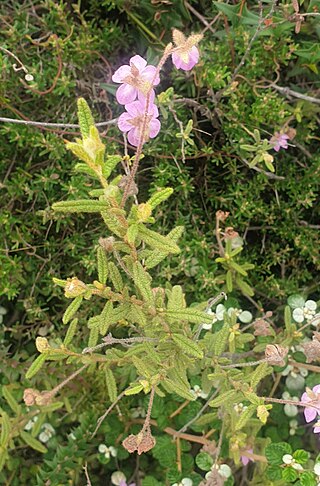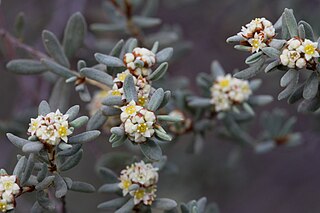
Bauera sessiliflora, also known as Grampians bauera, is a species of flowering plant in the family Cunoniaceae and is endemic to the Grampians region in Victoria, Australia. It is a scrambling shrub with wiry branches, trifoliate leaves and pink or magenta flowers.

Prostanthera eurybioides, commonly known as Monarto mintbush, is a species of flowering plant in the family Lamiaceae and is endemic to the south-east of South Australia. It is a low, spreading shrub with densely hairy branches, thick, elliptic to egg-shaped leaves clustered on short shoots, and violet to mid-purple flowers that are white with orange and dark purple dots inside the petal tube.

Pultenaea muelleri, commonly known as Mueller's bush-pea, is a species of flowering plant in the family Fabaceae and is endemic to Victoria, Australia. It is a dense shrub with hairy stems, elliptic to narrow egg-shaped leaves with the narrower end towards the base, and yellow and red flowers arranged singly or in pairs on the ends of short side shoots.

Pultenaea juniperina, commonly known as prickly bush-pea or prickly beauty is a species of flowering plant in the family Fabaceae and is endemic to south-eastern Australia. It is an erect, spiky shrub with hairy stems, linear to narrow elliptic leaves with stipules at the base, and yellow-orange and red flowers.

Thomasia petalocalyx, commonly known as paper flower, is a species of flowering plant in the family Malvaceae and is endemic to southern Australia. It is a shrub with wrinkled, oblong to egg-shaped leaves and cup-shaped mauve flowers.

Nematolepis ovatifolia, is a small shrub with rusty coloured scales on the stems, smooth, glossy leaves and white flowers in small clusters in summer. It is endemic to New South Wales.

Pultenaea altissima, commonly known as tall bush-pea, is a species of flowering plant in the family Fabaceae and is endemic to south-eastern continental Australia. It is an erect shrub with spatula-shaped to egg-shaped leaves and yellow flowers in clusters at the ends of branches.
Pultenaea benthamii, commonly known as Bentham's bush-pea, is a species of flowering plant in the family Fabaceae and is endemic to south-eastern continental Australia. It is an erect shrub with sharply-pointed, narrow elliptic to linear leaves and yellow to orange and red flowers in clusters at the ends of branches.

Pultenaea canaliculata, commonly known as coast bush-pea, is a species of flowering plant in the family Fabaceae and is endemic to coastal areas of southern continental Australia. It is an rigid, spreading shrub with hairy, cylindrical leaves, and yellow and crimson flowers.

Pultenaea dentata, commonly known as clustered bush-pea, is a species of flowering plant in the family Fabaceae and is endemic to south-eastern Australia. It is an erect to low-lying or prostrate, open shrub with elliptic to narrow egg-shaped leaves and dense clusters of yellow, red and purple flowers.

Pultenaea hispidula, commonly known as rusty bush-pea, is a species of flowering plant in the family Fabaceae and is endemic to south-eastern continental Australia. It is an erect, spreading shrub with many drooping branches, oblong to egg-shaped leaves with the narrower end towards the base, and yellow to pale orange and red flowers.
Bossiaea distichoclada is a species of flowering plant in the family Fabaceae and is endemic to south-eastern continental Australia. It is an erect shrub with hairy branches, kidney-shaped to more or less round or heart-shaped leaves with the narrower end towards the base, and uniformly bright yellow flowers.

Pultenaea largiflorens, commonly known as twiggy bush-pea, is a species of flowering plant in the family Fabaceae and is endemic to south-eastern continental Australia. It is a rigid, erect shrub with narrow egg-shaped leaves with the narrower end towards the base, and bright yellow and crimson flowers.

Pultenaea laxiflora, commonly known as loose-flower bush-pea, is a species of flowering plant in the family Fabaceae and is endemic to south-eastern continental Australia. It is a low-lying to prostrate, spreading shrub with linear to narrow egg-shaped leaves with the narrower end towards the base, and yellow and red to brown or purple flowers.

Pultenaea platyphylla, commonly known as flat-leaf bush-pea, is a species of flowering plant in the family Fabaceae and is endemic to south-eastern continental Australia. It is an erect, rigidly-branched shrub with narrow egg-shaped to wedge-shaped leaves with the narrower end towards the base, and yellow to orange and red to purple flowers.

Pultenaea polifolia, commonly known as dusky bush-pea, is a species of flowering plant in the family Fabaceae and is endemic to south-eastern continental Australia. It is an erect to prostrate shrub with linear or elliptic to egg-shaped leaves with the narrower end towards the base, and yellow to orange and red to purple flowers.

Pultenaea pycnocephala, commonly known as dense-head bush-pea, is a species of flowering plant in the family Fabaceae and is endemic to eastern Australia. It is an erect shrub with hairy branches, egg-shaped leaves with the narrower end towards the base and yellow to red and purple, pea-like flowers.

Pultenaea rigida is a species of flowering plant in the family Fabaceae and is endemic to south-eastern South Australia. It is a rigid, erect to prostrate, much-branched shrub with lance-shaped, sharply-pointed leaves and yellow and red to purplish flowers.

Pultenaea subalpina, commonly known as rosy bush-pea, is a species of flowering plant in the family Fabaceae and is endemic to a restricted area of Victoria. It is a rigid, prostrate to erect or spreading shrub with linear leaves and pink, pea-like flowers.

Spyridium subochreatum is a species of flowering plant in the family Rhamnaceae and is endemic to southern continental Australia. It is a low shrub with linear to oblong or narrowly egg-shaped leaves, and dense clusters of creamy-white flowers with dark brown, papery bracts at the base.


















